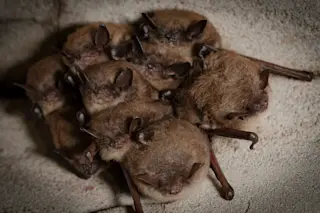Usually, small animals live shorter lives — not just because they’re more vulnerable to predators and environmental stress, but because their genetics don’t do much to protect them from cell damage over time. Not bats, though. Many bat species live for 20 to 40 years, in the wild or in captivity, baffling scientists.
Even more intriguing: cancer is almost unheard of in bats. That rare resistance has caught the attention of scientists at the University of Rochester, who recently published a study in Nature Communications digging into how bats manage to age so well without succumbing to disease. Their findings reveal three key biological strategies that help bats avoid cancer, insights that could one day improve how we treat or prevent it in humans.
Why Bats Are Worth Studying
To understand healthy aging, scientists often look to outliers: animals that live long lives without developing age-related diseases. Since cancer typically arises from accumulating genetic damage, long-lived species that rarely get it offer a natural case study in prevention.
The Rochester researchers had previously been focusing on whales and naked mole rats. But bats stood out: Some species live the human equivalent of nearly 180 years, yet tumors are almost never seen in wild or captive individuals. This quality makes bats an ideal model for understanding how aging and cancer might be uncoupled. It also challenges the assumption that longer life inevitably leads to more disease.
Read More: Why Do Some Animals Age Differently?
3 Ways Bats Conquer Cancer
To investigate, researchers examined fibroblast cells (connective tissue cells involved in healing and tumor development) from four bat species: the little brown bat (Myotis lucifugus), big brown bat (Eptesicus fuscus), cave nectar bat (Eonycteris spelaea), and Jamaican fruit bat (Artibeus jamaicensis). According to a press release, their observations revealed three cancer-fighting traits:
Supercharged tumor suppression: Like humans, bats have a gene called p53, often called the “guardian of the genome” for its ability to shut down faulty cells. In humans, p53 is inactive or mutated in about half of all cancers. But bats, particularly the little brown bat, found in upstate New York, show much higher p53 activity and even carry two active copies of the gene. This lets them eliminate problem cells early through a process called apoptosis, without damaging healthy tissue, thanks to a finely tuned regulatory system.
Cells that regenerate safely: Bats keep the enzyme telomerase, for humans usually only found in stem, reproductive, and cancer cells, allowing their cells to keep dividing without degrading DNA, a feature that supports tissue repair. In most animals, this would raise the risk of cancer. But bats’ high p53 activity steps in as a safeguard, removing any cells that start to go rogue.
A high-performance immune system: Bats are known for hosting viruses without falling ill, and their immune systems are also unusually good at identifying and eliminating cancer cells. While human immune systems tend to weaken and grow more inflammatory with age, bats maintain balance, keeping both infections and age-related diseases like cancer in check.
What This Means for Humans
Cancer is a slow-building disease, often requiring many cellular “hits” before a tumor forms. Unlike other long-lived mammals however, in bats, cells can become cancerous with just two mutations, yet they rarely do, thanks to these built-in defense systems.
This makes bats a surprisingly useful model for cancer research. The Rochester team confirmed that boosting p53 activity can help eliminate or slow cancer, a strategy already being explored in drug development. There’s also growing interest in how telomerase might be safely used to aid tissue regeneration, although that wasn’t tested in this study.
Read More: Bat Tolerance to Viral Infections Could Help Humans Become More Resilient, Too
Article Sources
Our writers at Discovermagazine.com use peer-reviewed studies and high-quality sources for our articles, and our editors review for scientific accuracy and editorial standards. Review the sources used below for this article:
National Cancer Institute: Telomerase
Nature Communications: Limited cell-autonomous anticancer mechanisms in long-lived bats















